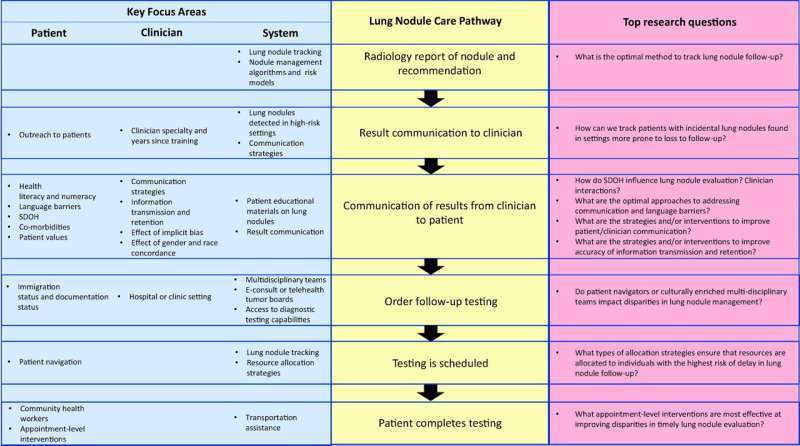This article has been reviewed according to Science X's editorial process and policies. Editors have highlighted the following attributes while ensuring the content's credibility:
fact-checked
peer-reviewed publication
trusted source
proofread
Researchers develop priorities for interventions to address health disparities in lung nodule management

Lung nodules are commonly found on diagnostic and screening computed tomography (CT) scans of the chest. Approximately five percent of individuals with lung nodules will ultimately receive diagnoses of lung cancer the leading cause of cancer death in men and women in the US and globally. Furthermore, lung cancer survival strongly depends on the stage of the cancer at diagnosis thus timely evaluation of lung nodules is key to achieving good long-term outcomes.
Health disparities in lung nodule follow-up and treatment are a major concern. Both Black and Latino patients have a higher risk of delayed follow-up for lung nodules. Delayed follow-up of lung nodules could result in higher levels of malignancy, disproportionately affecting the health of communities with higher lung cancer rates and contribute to health disparities in lung cancer stage and survival.
Led by researchers from Boston University Chobanian & Avedisian School of Medicine, a new American Thoracic Society (ATS) research statement summarizes the existing evidence, identifies research gaps and utilized a formal consensus development process to prioritize future research questions to mitigate health disparities in lung nodule evaluation including: considerations regarding research methodology and interventions at the patient, clinician, and health-system levels.
"This statement offers a research agenda to inform investigators and funding agencies on the considerations to generate high-priority, high-quality research on interventions to mitigate inequities in the evaluation of lung nodules," explains lead author Katrina Steiling, MD, MSc, assistant professor of medicine and chair of the ATS research committee.
Using a formal consensus development process, the committee identified several areas in which further research would significantly affect decision-making regarding resources, and strategies to address disparities in lung nodule management. Regarding research methodology, committee members gave their highest ratings to questions better defining the disparities in lung nodule management.
Within the patient domain, research questions related to how social determinants of health influence lung nodule evaluation and affect clinician interactions received the highest ratings. For the clinician domain, the need for studies to evaluate strategies to improve patient–clinician communication to reduce disparities in lung nodule evaluation was ranked highest.
Finally, in the health systems domain, committee members indicated that research on the effectiveness of specific interventions such as patient navigators and culturally trained multidisciplinary teams in reducing disparities was the highest priority.
The findings appear in the American Journal of Respiratory and Critical Care Medicine.
More information: Katrina Steiling et al, Research Priorities for Interventions to Address Health Disparities in Lung Nodule Management: An Official American Thoracic Society Research Statement, American Journal of Respiratory and Critical Care Medicine (2023). DOI: 10.1164/rccm.202212-2216ST
















